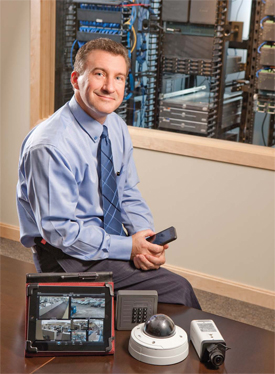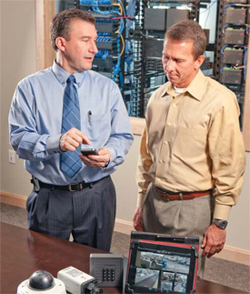The IT Integrator Advantage
By Gennifer Biggs, Business Solutions magazine.
This $155 million integrator sold more than $15 million in security solutions in 2011 by leveraging its network expertise and existing customer relationships.

Nearly five years ago, the leadership at Netech Corp., a large network technology integrator, made a choice to extend its IP and technology offerings — rooted in its impressive Cisco expertise — and build out a physical security business unit. Today, that unit accounts for nearly 10% of Netech’s $155M in sales revenue and is a robust part of the solutions provider’s success. Rick Zimmerman, who serves as the director of Netech’s Physical Security Division, and Brent Clodgo, general manager for Netech, have agreed to share their advice with other networking and infrastructure integrators that might be eyeing physical security as a strategic next step for business growth.
Take A Converging Technology Risk
Netech has grown steadily since its inception 15 years ago by taking its expertise around Cisco’s line card and building a solid networking business. Upon that foundation, it has added two specialty practices, taking a risk both times by investing in a technology just prior to its tipping point. Clodgo explains that about 12 years ago, Netech realized that convergence was going to forever alter the telephony market as voice joined data in the same environment. “We were network guys, but we realized that if this convergence thing worked out — we would really be ahead,” explains Clodgo. Netech went to work offering unified communication solutions to every customer it served, and today, Clodgo says that unified communication accounts for nearly 40% of sales.
Then about six years ago, the networking company saw another converging technology opportunity with physical security. “We thought video surveillance and access control had similar potential as telephony,” says Clodgo. “We understood that our customers were going to take cameras and access panels and put them on the network, and we wanted to be in the right place to take advantage of that.” From there, the networking experts took two major steps: They sought out and hired an expert in physical security — Zimmerman — and threw their hat in the ring with a handful of top vendors. The success of that decision has been reflected in solid, steady growth. So, what’s Netech’s secret to winning?
First Step: Find The Right Resources
Stop reading right here if you aren’t willing to invest in your preparations for a new technology on your line card. At the base of any expansion effort are experienced people whom you trust to guide your company through the other steps to success. Clodgo and Zimmerman recommend starting with your vendor partners when you start looking for superstars in the physical security space. That’s because physical security is such a specialty that it can take years to grasp the nuances of physical security solutions. “We knew IT, but we did not know the nomenclature and detail that went with physical security and access control, so we knew we wanted to bring in someone with that tribal knowledge,” explains Clodgo.
To find Zimmerman, whose entire career was spent in physical security, Netech sought help from manufacturing partners Lenel, Axis, and Sony. “We asked for help finding experts working at traditional physical security specialty companies that weren’t adjusting for convergence. Most of those experts understood what was coming and saw working with a company such as Netech as a move forward.” Zimmerman recommends being open about your business plan to marry network technology and physical security from the start and having a road map to share with potential hires. “Our story is one of the future versus our competitors — and their employers — who aren’t willing to change,” says Zimmerman.
The good news is that technology businesses should expect to pay physical security engineers, techs, and sales team members about the same as they do their technology specialists; the pay rates are quite similar.
Select Physical Security Products Carefully
While you are settling your human resources into place, start building the portfolio of products you want to use. For Netech, that decision-making process entailed choosing three strategic physical security vendors for each piece of the puzzle. The company looked for solution sets that offered enough range and flexibility to be used across Netech’s prime verticals, but also provided the interoperability to support the heterogeneous deployments needed for fully customized solutions.
For Netech, solutions include Lenel and RS2 for access control, ONSSI and Exacq for video surveillance products, and cameras from Axis, Sony, and Panasonic — to name just a few. “We try to identify partners that are best in class and products we can develop an expertise around, similar to what we’ve done with Cisco,” explains Zimmerman. He says a common problem is proprietary physical security solutions that can lock a customer in with a particular vendor, often bypassing the channel. “For many years, it was an acceptable model, but the customer base is much more educated today; they know they don’t want to get locked into a product that can’t be serviced or supported by their solutions provider of choice,” he adds. That same mindset has — at least with Netech’s customers, who lean toward the midmarket size — eliminated most arguments about self-service physical security that can sometimes pop up at the SMB level.
Understand The Methodology Of Physical Security
Let’s get this straight now: physical security is not just another technology deployment. The sooner a solutions provider with a network and infrastructure background gets that straight, advises Zimmerman, the better for business. “Physical security is about the application,” he says. It is more than the sum of the parts and requires similar proof of concept as complicated wireless deployments, a lesson many technology providers learned several years ago.
Fine details that stretch well beyond the selection of products can make or break a deployment, including everything from where and how you place an IP surveillance camera to the power requirements for outdoor systems. “There is a lot to say about the technology we do, but often tech guys think they can just add product and get it right,” says Zimmerman. Instead, you must consider the application, the environment, the users, and more — effectively turning each customer’s system into a completely unique creation. To grasp those nuances, refer back to hiring experts. But as you move forward, expect to lean on vendor partners to stay up on cutting-edge products, especially as technologies such as virtualization start to butt heads with physical security innovations. “For example, on the technology side, there is a well-established SOP for virtualizing a network,” says Zimmerman. “But what happens when you want to add on physical security? Probably 1 of 10 vendors has a product that can integrate into that environment.”
Zimmerman also recommends a common business mustdo for keeping up on shifts in the physical security market: talk regularly with your customers. Netech most often — 70% to 80% of the time — works with an internal IT person or staff, so keeping those lines of communication open often provides peeks into evolving needs in the customers’ environment. “We not only talk with them to keep a finger on the pulse of the market, we provide service and maintenance plans that help turn us into strategic partners,” explains Zimmerman. “As that environment evolves, we are in place to make sure all the technology in that environment is moving forward and working together correctly.”

“We try to identify partners that are best in class and products we can develop an expertise around, similar to what we’ve done with Cisco.” — Rick Zimmerman (left) photographed with Brent Clodgo, GM, Netech
Understand Timing Of Physical Security
The last tip from Netech might seem a bit out of place, but Clodgo and Zimmerman stress that it often trips up technology solutions providers. “The rules of engagement from a business engagement standpoint are very different,” says Zimmerman. Rather than working directly with a customer, physical security deployments are often embedded in expansion and construction projects, meaning the technology provider becomes part of the contractor/subcontractor world. “It is a very different business model to manage through,” warns Clodgo. The problem arises because many businesses still consider physical security as a physical plant element, only handing it off to IT to handle once installation is complete. For Netech, that reality has meant hiring for an unusual skill set — construction experience.
Zimmerman explains that because physical security solutions are often provided to construction firms for installation, leaving Netech to troubleshoot way down the line, the tech provider has developed expertise around the hardware itself in order to handle installation from the ground up. “If you can offer to work as part of the construction effort — installing door hardware and lock sets, electrifying hinges, etc. — you are truly offering a turnkey solution at that point,” says Zimmerman. That means being prepared with the trucks, tools, and the hands-on experience that network specialists rarely need. “Your network guys are happy with a laptop; these experts need everything up to and including a drill,” says Zimmerman. There is an advantage to investing in these tools. “You want to bring a solution to a customer that showcases that you are their problem solver — from A to Z,” he says. “They expect implementation, deployment, and after-market support. Let’s be honest, if everything is working but the door won’t unlock, you don’t want to be missing the skilled person to fix it.”
Netech encourages technology specialists to consider taking on physical security as it expects continued growth, especially as vendors start to tailor their products toward technology-minded providers. “Physical security has solidified us with accounts we were already in, both those where we were doing networking and now do physical security, and vice versa,” says Clodgo of the impact physical security has had on Netech. The trick, he says, is taking the time to evaluate and add the right resources, technology, and specialty expertise to do the job right.

